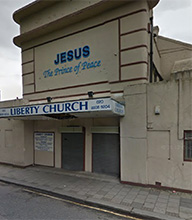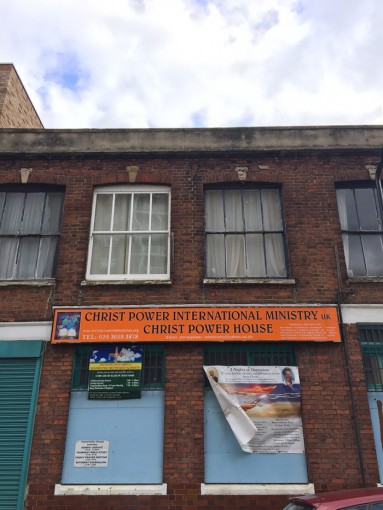
London’s discarded lots become holy ground
Places I’ve gone in search of God: The function suite of a North London bowling alley, a Grade II-listed rock venue way past its prime, a pub basement, two mouldy rooms in a dilapidated hotel on Seven Sisters Road, the rough as fuck Temple club in Tottenham (knocked down in 2004, now a set of luxury flats), and more than a dozen industrial estates. Spaces that were once reserved for heavy industry—storing, building, fixing, whatever, where old metals were scraped and clanged to work and then put to rest—are now, in London, overwhelmingly sites of
You can spot these places by the wonky and wonkily optimistic PVC banners hanging on their outsides:
“Faith Miracle Centre”
“Jesus Is Risen Temple”
“Mountain of Fire Ministries”
Scriptures, affirmations, and contact details are also printed on these glossy signs. Their words so idiosyncratically coloured, capitalised, and italicised that you can’t help but read them in the booming salesman-like voice of an evangelical pastor.
I affectionately call these places “trash spaces” because they look as though they’ve been thrown away. Even after a congregation of Africans has come along, dusted them off and put them to use, they feel reluctant.
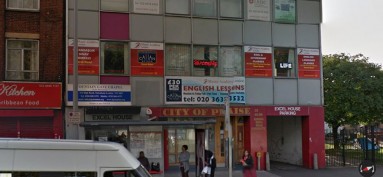
The other religions in my corner of London occupied worthier spaces, buildings into which you can imagine inviting Jesus, or the Queen. The Catholics worship at the fancier end of the high street. Churches of England next to parks, or in front of well-tended graveyards, look purposeful and storybook serene. North London Muslims had the now infamous mosque at Finsbury Park which Prince Charles helped open in 1994, its domed roof painted a burnished gold I’d never seen before. Even the Seventh Day Adventists who in their comings and goings appeared to be a relatively small group—and just as black as us African Christians—had a shed behind a bowling green that looked like a cozy cottage.
By contrast, our worship felt illegitimate, it was always a tucked-away affair. Off the high street, down a slip road, across a car park, behind an alley, up concrete steps, into a square building with a flat roof. I used to be embarrassed for us, traipsing into these places in our brightest pastels and too-tight shoes. “The Lord is here” was always the pastor’s opening salvo. He’d go on to to quote Matthew 18:20, “Where two or three are gathered together…” and even with all the faith I had back then I couldn’t imagine it. God coming to visit us in these rooms with their distractingly sticky floors and ceilings decorated with circles of damp.
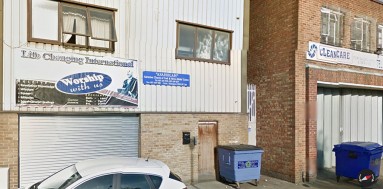
Eventually I dispensed with faith. I got tired of being “sure of what I hoped for, certain of what I could not see” (Hebrews 11:1) and decided to believe only in whatever I could hold, squeeze, crush in my hands. Since I stopped looking for God, trash spaces in London have multiplied. At first I thought I was imagining it or my brain was playing that familiar trick—the one where when you peek back at a thing after looking away for so long and it appears larger. But among London’s African population church attendance is up, so it makes sense that there’d be more places to worship. Being Built Together, a 2009 study by the University of Roehampton, notes that the London borough of Southwark has 240 standalone African churches, the highest concentration outside of the continent itself. An increased need for places where Africans can worship has led to many “established churches in inappropriate settings.”
Recent discoveries: The old laser tag arena at Turnpike Lane is now Liberty Church. On Old Kent Road, the flashing lights of the Holy Ghost Zone make it easily mistaken for a shabby nightclub. An Overcomers Parish has opened on the industrial estate opposite my former church. In all the chaos and effort of what Hackney estate agents term “vibrant restructuring,” up the road from Burberry’s new outlet and two streets away from an Anya Hindmarch boutique, a row of beaten-up terrace houses survives, one of which hosts Christ Power International Ministry.
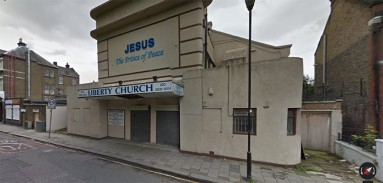
My favourite: the abandoned supermarket down the road from my house. Monday through Saturday its big glass front is shut up, dead, dark behind wooden hoardings painted white. On Sundays, the shop leaks fluorescent light and you can hear male and female voices singing worship songs. It is as if their praise powers the building.
London is ever changing; that’s what cities do. Every day hard-hatted men unfurl plans, tear down walls, put up cranes that stab the sky. This is progress and also decline. Another conversation piece high rise, another superstructure, another residential development and other cold euphemisms for home. I bragged about it all at first. The pace of change. The new old-style hotel at Kings Cross. The Bermondsey biscuit factory that became shared artists’ studios before it was turned into exclusive high-end flats. The idiosyncratically shaped buildings that newly clutter London’s skyline, made of a grey glass that even close up looks like steel. As someone who has never had much of it I can’t say it isn’t thrilling to be in such close proximity to lots of money, to see what it can do and how quickly. All down Commercial Street the air smells newly thick with it, a scent that sometimes makes my nipples hard.
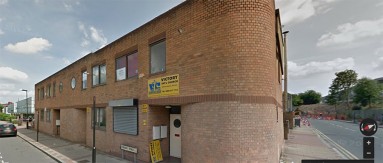
As a worshipper in a trash space, you encourage yourself to block out the city, to take pause and find catharsis, comfort in what you lack. You are not rich but sanctified, it’s a blessing to want and to have a God to trust to deliver. This is how we African Christians became such faithful adherents of the prosperity gospel, in the same breath that we thank god for our poor holiness, we ask him to make us rich, worldly, worthy. We triple highlight Jeremiah 29:11, “For I know the plans I have for you,” declares the Lord, “plans to prosper you…”
Kingsway International Church Centre is the only concrete example I have of a trash church made wealthy. Europe’s biggest megachurch is run by pastor Matthew Ashimolowo, a man with a perfectly square head on battleship broad shoulders. When preaching, he lurches from the lectern to the front of the stage and often whips off his suit jacket. He projects the overconfident energy of a typical London property developer. When my family and I were members of the congregation in the mid-’90s the worship took place in a three-story building on a road that faced barren land. The chairs were red velvet cozy but all three floors of the building—which gave no clues as to what to it had been before, its large rooms and small windows suggested a factory or performance space—were too echoey and cold. The street was unremarkable, half lined with neglected semi-detached houses.
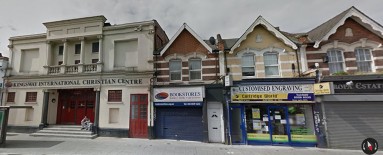
We stopped attending KICC just as it was expanding, holding Sunday services all over trash spaces in Hackney, including at the Empire Theatre and York Hall. With a steady membership of 4000 regularly tithing ten percent of their income, the church was able to buy a 9.5 acre industrial site on Waterden Road. On its website, the church boasts of how it fought off competition from “major corporate companies such as Sainsbury’s, the supermarket,” and was able to make the £2.7 million purchase debt free. There were plans to eventually build it into a holy arena, but in 2006 the local council asked KICC to vacate to make way for the 2012 London Olympics developments. (It’s not clear whether the church was compensated for the move.) KICC shuffled out further east, where it bought an abandoned cinema in Walthamstow, a space which today hosts up to 12,000 worshippers every Sunday, in shifts of five services. 40 miles southwest, just outside London is its sprawling 24-acre, 12-building headquarters (church and church offices) in Buckmore Park, Kent. (“All these were acquired for £5 million debt-free! Thanks to the generosity of our members and friends of KICC.”) KICC also has 8 branches in cities across the UK including Birmingham, Oxford, and Manchester, all in old buildings made new by praise, tithes and faith.
The last place I worshipped looks exactly the same today as it did ten years ago, though its neighborhood is being remade in fits and starts—two new housing developments, a handful of boutique cafes, pubs becoming more gastro. When I pass the flat-roofed building that looks like it is shrugging, I stop and stare, eyeball it. I think: By committing to these places we are showcasing a specific vulnerability, we’re showing what we lack. All our black poverty, all our immigrant longing, wrapped up in one space. These are the places we hoard our hope.
Setting up scrappy spaces as places of communal worship feels so much what it is to be African, and black, in this city. To make the margins your centre. All your faith is in what isn’t being built, shiny and new, because nothing here has been built for you. It is in what’s been left over, what you can bring yourself to believe in, what you could transform.
Trash spaces are the only real treasure we have.
